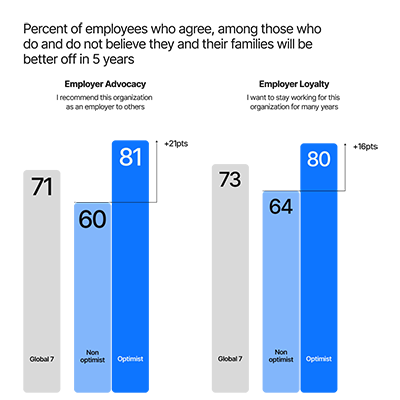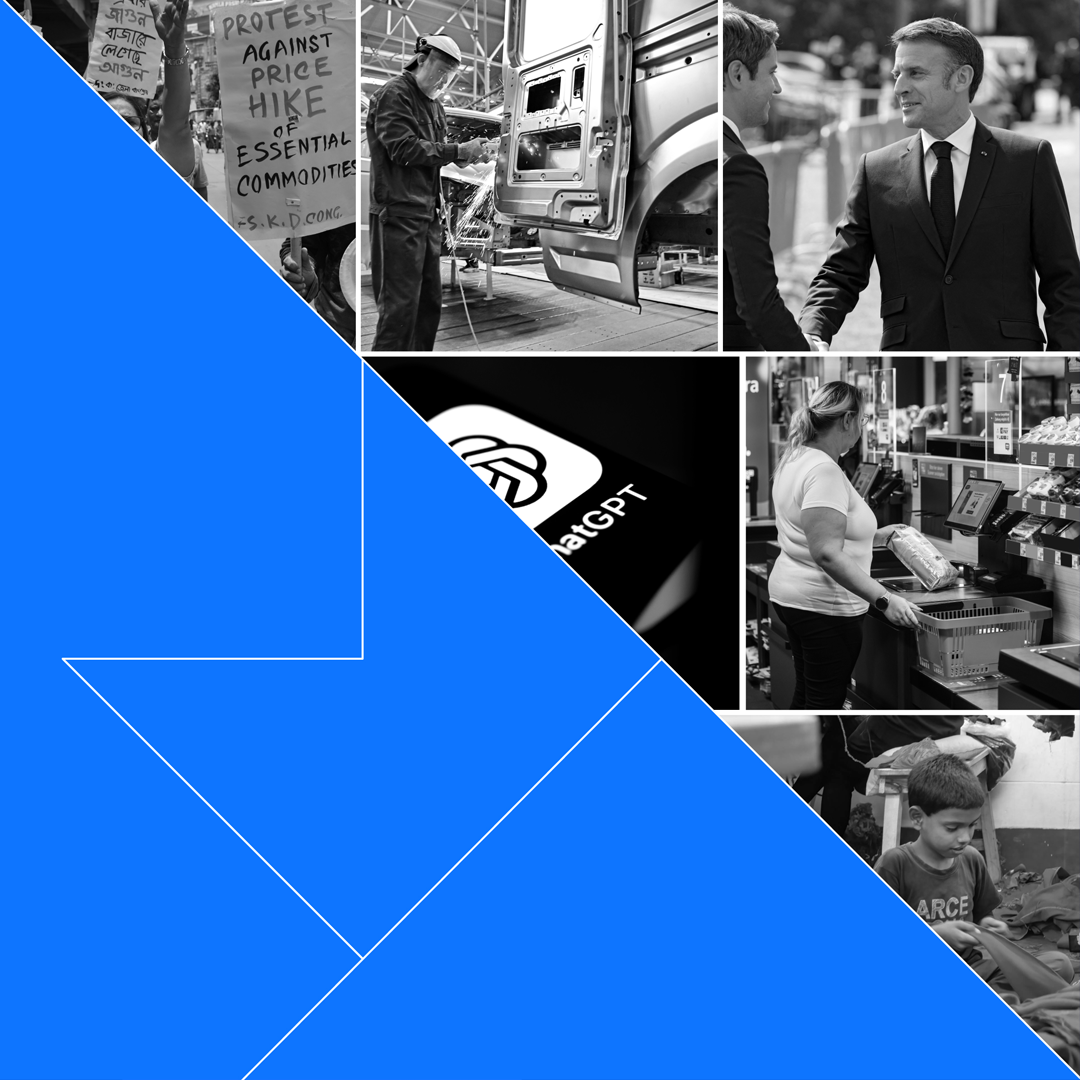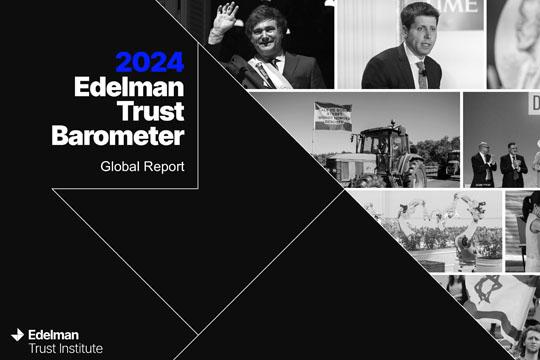- Global (EN)
- Africa (EN)
- Australia (EN)
- Belgium (EN)
- Brasil (PT)
- Canada (EN)
- Canada (FR)
- China (CN)
- France (FR)
- Germany (DE)
- Germany (EN)
- Hong Kong, China (EN)
- India (EN)
- Indonesia (EN)
- Ireland (EN)
- Italy (IT)
- Italy (EN)
- Japan (JP)
- Korea (KR)
- Latin America (ES)
- Malaysia (EN)
- Middle East (EN)
- Netherlands (EN)
- Spain (ES)
- UK (EN)
- Global (EN)
- Africa (EN)
- Australia (EN)
- Belgium (EN)
- Brasil (PT)
- Canada (EN)
- Canada (FR)
- China (CN)
- France (FR)
- Germany (DE)
- Germany (EN)
- Hong Kong, China (EN)
- India (EN)
- Indonesia (EN)
- Ireland (EN)
- Italy (IT)
- Italy (EN)
- Japan (JP)
- Korea (KR)
- Latin America (ES)
- Malaysia (EN)
- Middle East (EN)
- Netherlands (EN)
- Spain (ES)
- UK (EN)
New data from the 2024 Edelman Trust Barometer Special Report: Trust at Work reveals an unexpected and polarizing gap that must be closed: As of January, there is a 39-point chasm between executives (EVP+) and associates (non-manager and entry level) on personal economic optimism as defined by this simple but highly revealing question, “When you think about the economic prospects for yourself and your family, how do you think you and your family will be doing in five years' time?”

It is urgent to bridge this gulf between execs and associates, in part because it impacts performance and productivity: The new data tells us that associates are two times less likely to take on additional work without pay than executives. But there are equally hard-hitting implications around employee mental health and trust in the workplace: Associates are only half as likely as executives to report very good mental health. And compared to executives, associates are far less likely to trust their employer.
Closing this economic optimism gap is also vital from a macroeconomic perspective since, simply put, what employees expect can influence the broader economy. For instance, if they expect inflation to rise and their employer is not well positioned to invest in employees and their long-term employment, they start looking for higher paying careers, demand higher wages, or start buying more goods today, driving prices further up and fulfilling their initial expectation.
Moreover, from a socioeconomic point of view, economic optimism gaps can radiate outwards into society: The data shows that economic optimists are more willing to make personal sacrifices for their country (as of January 2023) and work through ideological division (as of January 2024), spawning activism, from populism to labor movements.
While we see this gulf between executives’ and associates’ levels of economic optimism widening and playing out in the workplace and society, employers are the ones who have the power to reduce it. By providing employees with opportunities for career advancement, impact, and agency, employers can boost optimism and, thereby, trust.
How to reduce polarization between executives and associates by instilling workforce optimism
It’s important to recognize that nearly three quarters of employees say that employers have yet to deliver on what they want from work. But respondents told us that enabling these three aspects of their employee experience can improve personal economic optimism:
- SUSTAINABLE EMPLOYMENT. The UK government recently defined sustainable employment as “supporting people to stay in work and advance.” In the U.S., the National Institutes of Health believe sustainable employment is a public health issue, defining it this way: “Sustainable employability commonly refers to the ability of employees to participate in work and the labor market during their lifetimes [1]. Because this ability is very important for individuals, organizations, and society, it deserves our attention.
- For individuals, work provides economic security and social ties, as well as forming an important part of and giving meaning to their daily lives.
- Organizations need productive employees to improve organizational performance and survive market competition.
- Society needs as many people as possible to participate in the labor market to maintain economic welfare and social stability.”
So, what are the pillars of sustainable employment that engender workplace optimism and build trust between employees and their employers? Beyond the basics of fair pay and a safe workplace, respondents told us these three elements are critical to their sense of sustainable employment:
- Continuous learning and development: Invest in my future-facing skills and enable my long-term development.
- Ability to chart a career path: In addition to talent development programs, adopt an overarching talent strategy and ethos that relies on developing workers and not replacing (or outsourcing) them and their roles.
- An inclusive, diverse workplace that provides a sense of belonging: The current backlash against Diversity, Equity and Inclusion initiatives is causing some companies to re-think their commitments and/or create euphemisms for DEI. According to this year’s Edelman Trust Barometer Special Report: Business and Racial Justice, 64 percent of U.S. respondents agree that organizations leverage DEI initiatives to improve business outcomes, rather than to push a political agenda.
- A SENSE OF AGENCY. Increasingly, workers expect agency over their employee experience, whether it is how AI impacts their work or how they contribute their bottom-up insights to meet top-down strategic planning. Create a sense of agency by being transparent in your communications, listening to diverse viewpoints and inviting your people to contribute to planning. This is particularly important when it comes to engaging employees in large-scale transformation; doing so can engender discretionary effort and accelerate results. With agency and personal economic optimism, workers are much more likely to embrace new technologies such as AI and there is an ROI of loyalty and trust.
- IMPACT. Be aware that the majority of employees say they are more likely to work for a company if it publicly demonstrates a commitment to social issues, such as access to healthcare, gender equity, climate action, and protecting LGBTQIA rights.
The benefits of closing the economic optimism gap
If associates feel they have a career path, agency and impact, there is a significant lift in economic optimism -- which helps close the gulf between them and executives.

When you close the economic optimism gap, employees advocate much more on behalf of the employer. Discretionary effort soars. Employer loyalty increases. Trust is enhanced. But there is also a positive benefit to society. With personal economic optimism, civic attitudes surge and trust radiates outwards from the workplace to the marketplace, even helping lift trust across other institutions. So, in an era of constant disruptive change, the role of the employer has never been so critical.
Cydney Roach is the Global Chair, Workplace Advisory.




